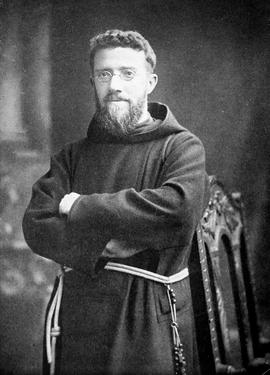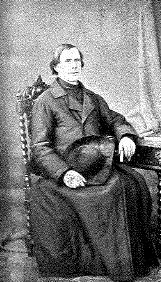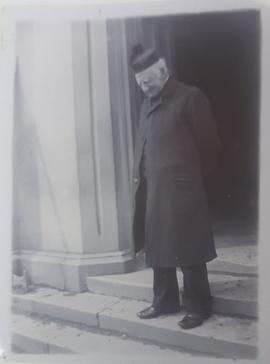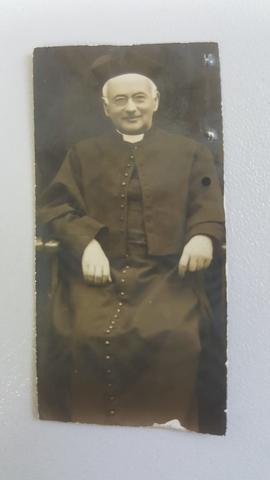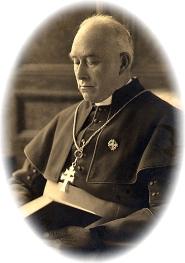In the retreat of our Province dedicated to him, the festival of St Paul of the Cross has been, in two successive years, marked by a death of a son who had served his Congregation through many and devoted years. Last year Father Gregory of St Joseph, this year Father Pius of the Holy Ghost was called to his reward, at Mount Argus, on the Saints Festival.
Father Pius of the Holy Ghost - in the world James Devine - was at Aclare, Co. Sligo, on the festival of the Epiphany, 1838. He made his classical studies at the seminary of his native diocese, Achonry, and then went to Maynooth where, after four years study, he received Minor Orders. But it pleased Almighty God to bestow upon him the grace of a vocation to the religious life; and soon two things turned his thoughts to the Congregation of the Passion, one was a retreat given at Maynooth by Father Vincent Grotti, the founder of Mount Argus, and the other the chance perusal of the life of Father Paul Mary Packenham, its first Rector, who had died soon after the arduous labours of a mission given by us in Rathmines Parish Church. Father Pius entered the Novitiate in the autumn of 1858 and was professed on September 29th of the following year. In 1861 he was ordained priest at St Joseph's, Highgate; and immediately commenced that career of Professor of Theology which he was to pursue so successfully through many years. When, in November, 1867 all the students of the Province were gathered in Dublin, under the presidency of Father Ignatius Paoli, afterwards Archbishop of Bucharest, Father Pius was truly his "right hand," and a guiding spirit in raising our ecclesiastical studies to a very high level. This purpose he was able still more to further by his directorship of the Retreat from 1869 to 1872. During his term of office he was sent as the Visitor - General to our houses in the United States, a high responsibility, successfully discharged. As Rector of Mount Argus, he had felt keenly the inadequacy of the brick chapel first erected, though the old family mansion had been adapted to form one structure with it, and now he generously volunteered to cross again the Atlantic to raise funds for the erection of a suitable church. For this he lectured in many cities of the United States, and afterwards begged in Chile, and, crossing the Andes on a mule by the old Pioneer Road to lessen expense, also in the Argentine Republic. On his return home, he was elected, in 1875, Rector of Holy Cross, Belfast, where he commenced the building of the present monastery. At the close of this term of office, he returned to the work most congenial to him, teaching, which, interspersed with missions, and retreats to religious communities, engaged his gifted and active spirit as long as health remained. For it pleased Divine Providence to lay upon him during the last 10 years of his life a trial most heavy, because the crucifixion of his strongest characteristic, the cross of inactivity. Stealthily but surely gout seized upon his strong frame with relentless grip, crippling him so that he could no longer say Mass, and painfully affecting his memory. To his nature, inactivity and helplessness were bitter indeed, and through these years many hours silent and lonely shrunk but did not quell his cheerful spirit. These were the crown of his work, and the purifying of his love for God; in him "patients" had "it's perfect work." The end came without pain, and was in perfect peace. He had received the last sacraments on April 26th, festival of Our Lady of Good Counsel, and on the 29th, comforted by the presence of his brother, Father Arthur, and in full possession of his senses, he calmly resigned his soul to his Maker.
Father Pius's gifts were great and many, and had received from earliest years effective training. His knowledge of the classics was that of the old school, delighting to fit occasion with apt quotation. He spoke several modern languages: in Gaelic he was a foremost scholar and authority, it was the tongue of his childhood and that in which his last earthly prayers were breathed to God. In the sacred sciences he had the large and accurate knowledge that comes with years of teaching. His outlook on all things was broad; on all men was kindly. To his ready pen we owe several works of great interest, notably the "Life of Father Ignatius Spencer," "Eutropia," or instructions for converts, and the "Life of St Paul of the Cross." He had been present in the great basilica at the canonisation of St Paul not as a spectator, but with the assistant clergy as a torch - bearer, and his description not only is of a thing seen in the glow of faith, but rises to a high order of literary excellence.
His early years in the Congregation were spent with the first fathers of our Province, men who had much and hard work to do and who, as true leaders, did it thoughtless of themselves, and reliant upon God: he had their spirit: his going is the breaking of a link with the past: a past that cannot altogether fade from our vision, for their memories are happily with us, while themselves and their reward are with God.
(CROSS, Vol. III, p.77f.)
https://passionistarchives.ie/index.php/fr-pius-devine/

